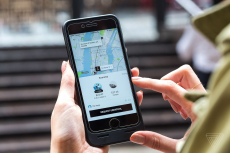
As my driver turned the last corner, teary and passionately he explained how Uber had “saved” his life, how it kept him above the unemployment queues, how it fed his two children and provided a roof over his head, no matter how small it was. As an immigrant with the bare scratches of education, he was able to find happiness and make his own wage; though the very company he worked for was tearing down the black cab industry a couple miles away.
“Survival” he called it, and although he was working his own hours and was a man of his labour, he knew Uber was the fierce competition to the TaxiCab service which dominated the market for late night travel for the last decade. Uber has brought much work to the market, and approximately 6,700 jobs have been instilled as a result of the internet company, (Uber.com). Uber have surpassed all expectation and progressed in leaps as they pushed past the London black cabs to dominate the private London travel market, (ignoring TFL).
Uber have dominated the London scene for travel and have somewhat become a revelation since TFL. Reason attributed to their success stems from the simplicity and ease of acquiring means of transport as a nearby car could be called within minutes of waiting. Their card system also reduces the hassle of splitting fares by cash and eliminates problems of fare dodgers. As a result, this, guarantees drivers their wage or moreover compensation. The average full time employee of Uber earns the equivalent of £15 per hour, with potential annual net incomes of up to £40,000 a year, surprisingly more than or equal to the pay of junior doctors. Consequently, sparking interest and controversy surrounding heavier regulations on these internet companies. Moreover, they are beginning to eradicate the black cab industry due to the high demand for Uber. Additionally, Uber infamously pays far less tax, which has propelled increasing criticism surrounding the internet company and its funding.
Surge pricing is also a fundamental aspect of Uber as this determines prices when high demand for travel is sought after with only a limited number of cars on the road in a certain area. The multiplier is dependent on the availability of drivers and riders and consequently uses microeconomics in order to determine an equilibrium price. Although surge pricing is a multiplier on top of normal fares to reduce demand, it can have crippling prices in times of emergency. In times of emergency such as Hurricane Sandy, fare prices with Uber soared, giving consumers no choice but to agree to the higher prices. Likewise, during the tube and TFL strike of July 2015, Uber tripled prices in order to capitalise on the chaos that unfolded in the city. As demand were off the charts and prices increasing by over 300%, it is argued this needs to become regulated.
In the time of demand such as the 2015 tube strikes, a commuter spent £150 for a 5 mile journey from Clapham Common to an area in Whitechapel suggesting regulations such as caps on the multiplier ‘surge’ pricing needs to occur as well as overall maximum price cap being required for a certain amount of miles. Using the Uber pricing on its website: for a regular UberX the maximum amount of money charged for a five mile journey should be around £15.75, including both the mileage and minute fees. This is 89.5% less than the fee paid by the above commuter and is attributed to the additional costs caused by the surge pricing mechanism; thus, suggesting a cap is required in times of emergency and as part of consumer satisfaction.
Image Credits: theverge.com

0 Comment:
Be the first one to comment on this article.